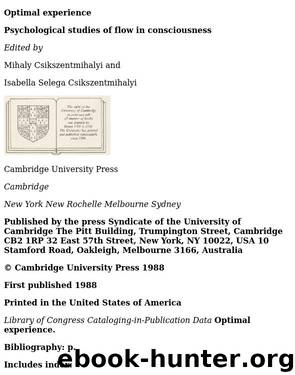Optimal Experience - Mihaly Csikszentmihalyi by Mihaly Csikszentmihalyi

Author:Mihaly Csikszentmihalyi
Language: eng
Format: epub
12. Modernization and the changing contexts of flow in work and leisure
antonella delle fave and fausto massimini
Cultures differ enormously in terms of the range of opportunities they make available to the people who live in them, and in terms of the skills that the average inhabitant feels he or she possesses. The same culture may vary dramatically along these dimensions at two different points in time. Therefore the quality of subjective experience of a typical member of society will also vary. These days, when anthropologists are more than ever hesitant to breach the neutrality of cultural relativism, and when imposing Western standards of interpretation and description on foreign cultures has become a heresy to be avoided at all costs, it might be that focusing on the self-reported experiences of native respondents will provide a viable comparative method.
Accordingly, this chapter reports on extensive interviews with four European groups that, although living in close geographical proximity, are part of very different ecologies and cultural environments. They differ especially in the degree to which they still follow a traditional agricultural lifestyle, as opposed to being integrated with the technological life of the cities. The purpose is to compare how optimal experience is described in such contexts, to see what different activities it is experienced in, and to infer the effects that modernization is having on the quality of subjective experience.
Traditional rural societies have occasionally succeeded in developing lifestyles that are well suited to the requirements of their particular ecological niche, and at the same time have been able to arrange the tasks necessary for survival in such a manner that the people living in the culture find performing them enjoyable and rewarding. This particular synergy of inner and outer needs is generally lost during the process of modernization, when new techniques of production and new social arrangements temporarily destroy the equilibrium achieved by the older traditional forms.
In any given historical period, the quality of life in a given culture will depend in great measure on whether the activities necessary for survival
- including work and basic maintenance activities - are able to provide optimal experiences. The progressive development of individual skills takes place mainly in response to the challenges of daily existence, and therefore the structure of everydayness is crucial for the development of human potentialities. In this chapter, we see how the relationship between flow and work is negotiated along a continuum of cultural settings ranging from traditional rural to industrial urban contexts.
In traditional cultures, there are no clear distinctions between what is work and what is leisure, at least as far as subjective experience is concerned. In modern societies, however, new criteria for the organization of work and for technological progress have altered people's perception of everyday tasks. Work often fails to provide varied opportunities for action and the clarity of goals and feedback that facilitate optimal experience; many are thus forced to search for it in the leisure activities that have greatly proliferated in modern cultures.
Data collected by our research group
Download
This site does not store any files on its server. We only index and link to content provided by other sites. Please contact the content providers to delete copyright contents if any and email us, we'll remove relevant links or contents immediately.
The Four Agreements by Don Miguel Ruiz(6744)
Flow by Mihaly Csikszentmihalyi(4687)
The Four Tendencies by Gretchen Rubin(4594)
Adulting by Kelly Williams Brown(4565)
You Do You by Sarah Knight(4464)
The Hacking of the American Mind by Robert H. Lustig(4375)
Ikigai by Héctor García & Francesc Miralles(4246)
Right Here, Right Now by Georgia Beers(4198)
A Simplified Life by Emily Ley(4157)
The Art of Happiness by The Dalai Lama(4125)
The Power of Positive Thinking by Norman Vincent Peale(4061)
The Little Book of Hygge by Meik Wiking(3682)
The French Women Don't Get Fat Cookbook by Mireille Guiliano(3655)
The Heroin Diaries by Nikki Sixx(3543)
The Courage to Be Disliked by Ichiro Kishimi & Fumitake Koga(3488)
The Choice by Edith Eva Eger(3467)
Why Buddhism is True by Robert Wright(3446)
Spark Joy by Marie Kondo(3298)
Make Your Bed by William H. Mcraven(3174)
